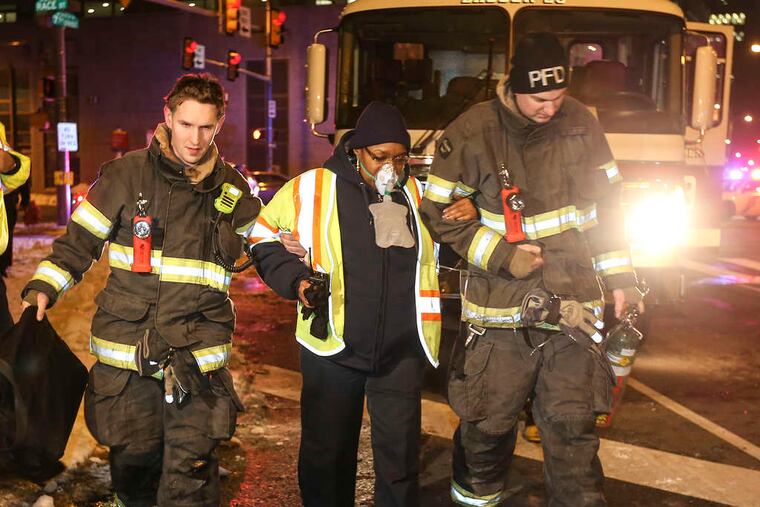PATCO hit by two breakdowns
PHILADELPHIAPATCO officials have started a "lessons learned" session on Monday afternoons to figure out how to improve service on the troubled commuter line between South Jersey and Center City.

PHILADELPHIAPATCO officials have started a "lessons learned" session on Monday afternoons to figure out how to improve service on the troubled commuter line between South Jersey and Center City.
They had plenty to work with this Monday.
During both the morning and evening rush hours, trains were disabled on the lone working track on the Benjamin Franklin Bridge, forcing evacuation of the trains and causing significant delays on a line already slowed by construction.
The morning breakdown was over the Delaware River, while the evening failure was on the approach to the bridge on the Philadelphia side.
In both cases, an electric traction motor underneath a train apparently was the culprit, shorting out, filling cars with smoke, and disabling the trains.
The traction motors, which seem especially vulnerable to damage from powdery snow, are among the components that will not be replaced as part of PATCO's ongoing $194 million rehabilitation of its 120 railcars. The existing motors will continue to be rebuilt as needed, to save money, PATCO officials have said.
In Monday's evening rush hour, some passengers were evacuated to the closed Franklin Square station before being placed on another train to continue their eastbound trip, PATCO spokesman Tim Ireland said.
Two passengers complaining of breathing problems were evacuated through an emergency exit in the area of Fourth and Florist Streets, police said.
Firefighters gained entry to the tracks through another emergency exit on Seventh Street just north of Race Street, police said.
PATCO service has been disrupted by the start last month of a two-year, $103 million track-replacement project on the bridge.
Monday's breakdowns compounded those delays and further upset passengers already irked by faltering service and a rash of broken escalators and elevators.
Delaware River Port Authority police were dispatched to crowded stations to help keep order during the morning rush hour, and the agency's acting chief executive and police chief also worked the platforms.
Some passengers spent more than an hour trying to make trips that typically take 15 minutes. Many complained about a lack of timely information about either the cause of the delays or the likely waiting time for another train.
On Monday morning, a westbound train broke down on the bridge before 8 a.m., when snow apparently caused a traction motor to short out and fill the train with the smell of smoke. That caused all trains in both directions to be held.
The train was eventually removed from the bridge and the passengers unloaded at the City Hall station in Camden.
After service was restored, trains had to be halted again when a woman fainted on the Eighth and Market platform as she prepared to board a train.
The evening rush hour was interrupted at 5:16 when an eastbound train broke down just before it emerged from the tunnel on the approach to the bridge.
Passengers in the two cars affected by smoke were moved onto another eastbound train, which took them from Franklin Square across the bridge. Passengers in the other two cars remained on the train, which was finally moved about 80 minutes after the fire.
John Hanson, the DRPA acting chief executive, said at the Haddonfield station in the morning that PATCO workers are trying to improve communications so waiting passengers can learn quickly what's wrong and when to expect a train to arrive.
Hanson said PATCO would use social media, in-station public-address announcements, and on-site staff to inform waiting passengers about delays. Peak hour delays are most serious on Mondays and Fridays, with some trains scheduled to run almost 30 minutes apart. On Tuesdays, Wednesdays, and Thursdays, trains are scheduled to run five to nine minutes apart during peak hours. PATCO is closing one of two tracks on the bridge from 11 a.m. each Friday until 3:30 a.m. each Tuesday.